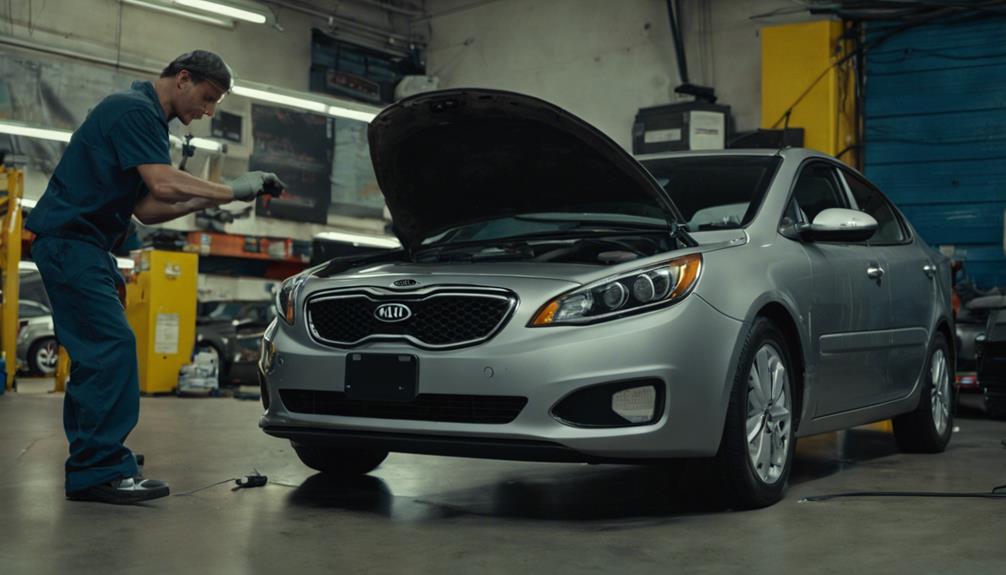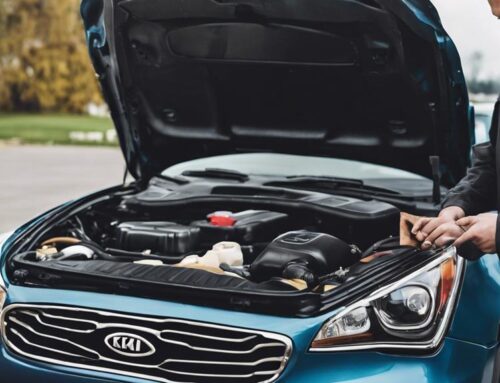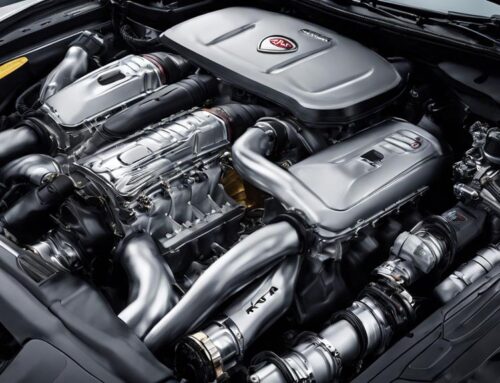If you're a Kia Spectra owner, you might encounter several common issues that affect performance. Engine problems like rough idling and stalling are often linked to dirty fuel filters or failing spark plugs. Transmission troubles, such as slipping gears, can arise from low fluid levels. Electrical system failures may result in battery drain and faulty wiring. Additionally, keep an eye on brake performance and suspension handling, as these areas can show signs of wear over time. Regular maintenance is essential to preventing these issues. You'll find even more insights to help keep your Spectra running smoothly ahead.
Key Takeaways
- Engine performance issues often arise from dirty filters or faulty sensors, leading to rough idling and stalling.
- Transmission troubles, such as slipping gears, may be caused by low fluid levels or worn components needing regular checks.
- Electrical system failures can result in battery drain or malfunctioning dashboard lights, requiring thorough inspections for faulty wiring.
- Brake system concerns include premature wear and fluid leaks, indicated by unusual noises when braking or spongy pedals.
- Cooling system challenges like overheating stem from radiator malfunctions or coolant leaks, necessitating regular maintenance and monitoring.
Engine Performance Problems
When it comes to engine performance problems in the Kia Spectra, you might notice a few common issues that can affect your driving experience. Many owners report symptoms like rough idling, stalling, or decreased acceleration.
These kia spectra problems can often be traced back to issues such as a dirty fuel filter, failing spark plugs, or even a malfunctioning mass airflow sensor. Additionally, understanding the safety features comparison can help provide context to the overall reliability of the vehicle.
To tackle these challenges, effective kia spectra troubleshooting is crucial. Start by checking the engine codes with an OBD-II scanner, which can pinpoint specific issues and guide your repairs.
Regular maintenance, like changing your air filter and spark plugs, can prevent many of these problems from arising in the first place.
If you're not comfortable performing these tasks yourself, reaching out to a trusted mechanic for kia spectra repairs is a great option. They can provide you with the expertise needed to resolve these engine performance issues efficiently.
Transmission Troubles
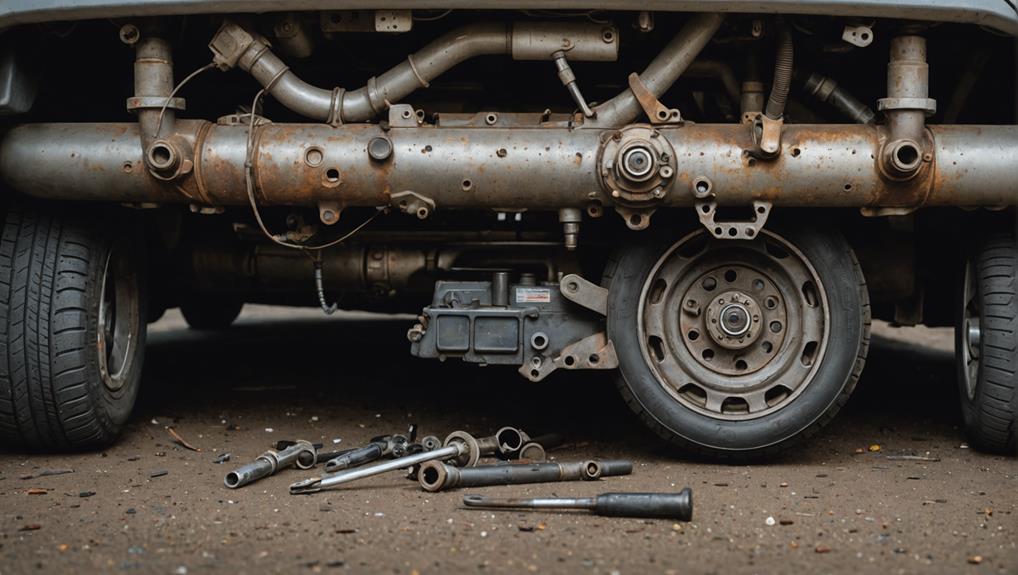
Transmission troubles in the Kia Spectra can be frustrating, and you might experience issues like slipping gears, delayed shifting, or unusual noises. These problems can stem from several factors, including low transmission fluid or worn components.
It's crucial to address these issues promptly, as they can lead to more significant damage.
To maintain your Kia Spectra's reliability, follow some simple maintenance tips. Regularly check your transmission fluid levels and make sure the fluid is clean and at the correct level. If you notice dark or burnt fluid, it's time for a change.
Additionally, pay attention to any warning signs; if your car hesitates or struggles to shift, don't ignore it.
Routine inspections by a trusted mechanic can help catch potential problems early. Keeping up with scheduled maintenance not only enhances your vehicle's performance but also prolongs its life.
Remember, you're not just serving yourself; you're ensuring your Kia Spectra remains a dependable vehicle for you and your loved ones.
Electrical System Failures

When you're driving your Kia Spectra, electrical system failures can really disrupt your experience.
You might notice battery drain problems, faulty wiring issues, or malfunctioning dashboard lights.
It's important to address these issues quickly to avoid further complications.
Battery Drain Problems
Many Kia Spectra owners have encountered frustrating battery drain problems, often linked to electrical system failures. If you find your battery regularly dying, it's crucial to investigate further. A common culprit is the vehicle's electrical components, which may not be turning off when they should. This can drain your battery overnight, leaving you stranded.
To help prevent battery drain, consider checking your dashboard lights, interior lights, and any aftermarket accessories you may have installed. Sometimes, simple issues like leaving a light on can lead to significant inconvenience.
If you suspect a deeper issue, having your electrical system inspected by a trusted mechanic can be invaluable. They can test the battery and alternator to verify they're functioning correctly.
Additionally, keep your battery terminals clean and securely connected. Corroded or loose connections can contribute to battery drain, even when the vehicle is off.
Regular maintenance and awareness of your vehicle's electrical system can save you time and hassle in the long run. By addressing these battery drain problems promptly, you'll not only enhance your Kia Spectra's performance but also guarantee a more reliable driving experience for yourself and those you care about.
Faulty Wiring Issues
Battery drain issues often point to larger problems within the electrical system, including faulty wiring. If you're experiencing unexpected battery drain, it's vital to investigate the wiring in your Kia Spectra. Faulty connections, frayed wires, or damaged insulation can disrupt the flow of electricity, leading to various electrical failures.
You should be aware that these wiring issues can affect not only the battery but also other components of your vehicle. For instance, you might notice intermittent power loss, which can be frustrating when you rely on your car's electrical system for daily activities. It's important to address these concerns promptly to avoid further complications.
When troubleshooting, look for visible signs of wear or damage to the wiring. Don't hesitate to consult a qualified mechanic if you suspect faulty wiring. They can perform a thorough inspection and help you understand the root cause of the problem.
Malfunctioning Dashboard Lights
Flashing dashboard lights can signal electrical system failures in your Kia Spectra, demanding your immediate attention. When these lights flicker or stay illuminated, it's essential to understand what they might indicate.
Often, they point to issues such as a failing battery, alternator problems, or wiring faults. Ignoring these warnings could lead to more severe complications, not just for your vehicle but also for your safety on the road.
You should start by checking your owner's manual to decipher the specific lights and their meanings. If you spot a warning light related to the engine, brakes, or battery, it's wise to act promptly. A simple visit to a trusted mechanic can help diagnose the problem before it escalates.
If you're feeling proactive, consider performing routine checks on your electrical system. Keeping an eye on the battery terminals for corrosion or confirming connections are secure can save you from future headaches.
Stay informed and vigilant—addressing these electrical issues promptly not only benefits your Kia Spectra but also helps guarantee a safe driving experience for you and those you serve.
Brake System Concerns
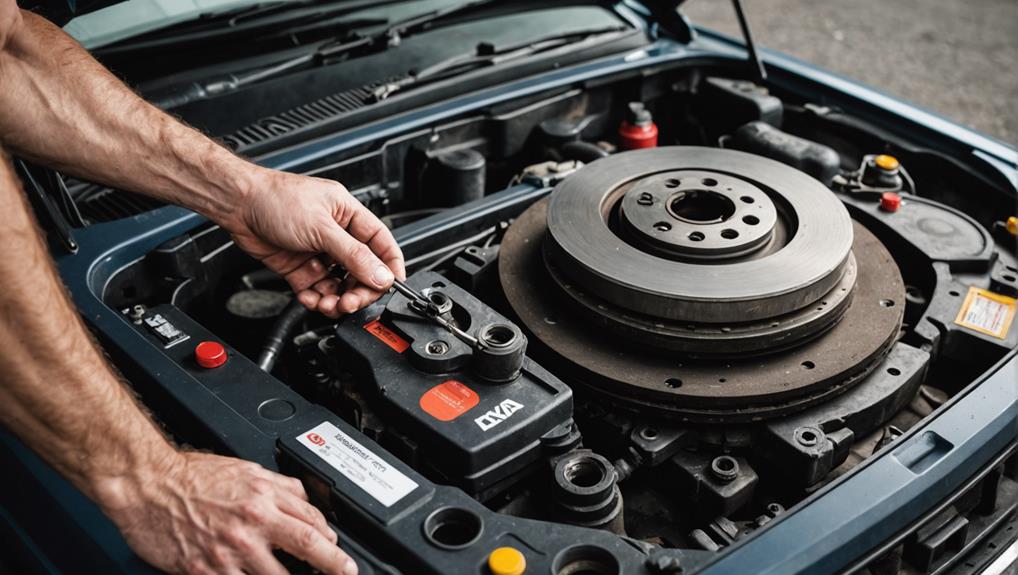
When it comes to the brake system of the Kia Spectra, drivers often report several concerns that can affect safety and performance. One common issue is the premature wear of brake pads and rotors, leading to reduced stopping power.
If you notice squeaking or grinding noises when braking, it's essential to address this immediately to avoid further damage and guarantee safety for you and others on the road.
Another concern is the brake fluid leak, which can result in a spongy brake pedal and compromised braking efficiency. If you find the brake pedal feels softer than usual, it's wise to check for leaks and have your system inspected promptly.
Additionally, some drivers experience issues with the anti-lock braking system (ABS), which may trigger warning lights or cause the brakes to engage unexpectedly.
Regular maintenance is key to preventing these problems. Make sure to schedule routine inspections and replace worn components as needed.
Suspension and Steering Issues
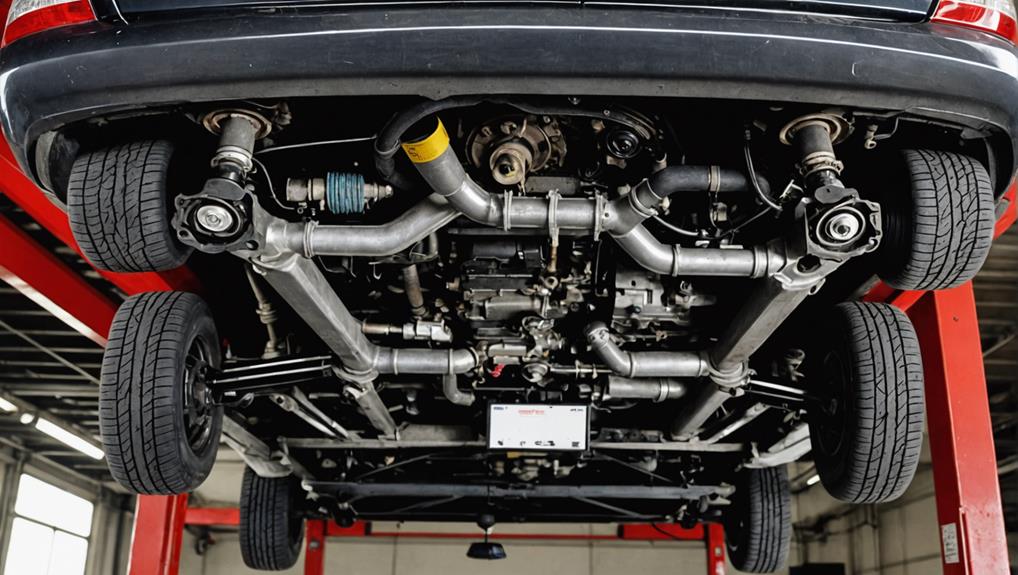
Many Kia Spectra owners face suspension and steering issues that can considerably impact their driving experience. If you're noticing unusual handling or noise while driving, it's essential to address these problems promptly. Ignoring them can lead to safety concerns or more costly repairs down the line.
Here are some common signs you might encounter:
- Uneven tire wear: This indicates alignment issues that need correction.
- Steering wheel vibrations: These can result from worn suspension components or imbalanced tires.
- Clunking noises: Listen for these when driving over bumps; they often signal worn bushings or struts.
- Pulling to one side: This can indicate alignment problems or uneven tire pressure.
- Stiff or unresponsive steering: If your steering feels heavy or sticks, it's time to inspect the power steering system.
Being proactive about these issues can enhance your driving comfort and safety.
Regular maintenance, including checks on the suspension and steering systems, is key to keeping your Kia Spectra in top shape. Make certain to consult a trusted mechanic if you notice any of these signs to guarantee your vehicle serves you well for years to come.
Cooling System Challenges
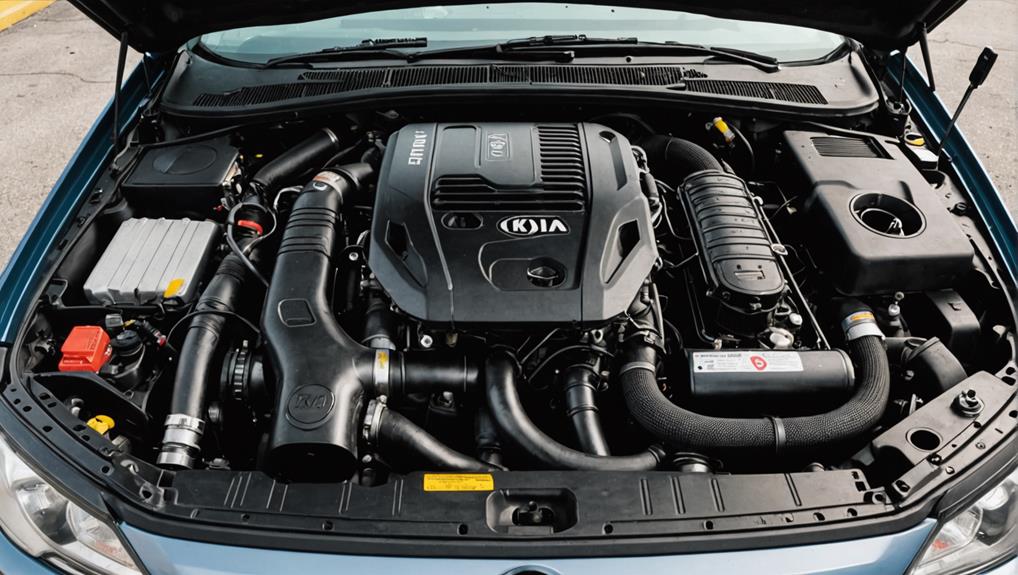
When it comes to your Kia Spectra, cooling system challenges can lead to serious engine problems. Overheating is a common issue that can arise from a malfunctioning radiator, which is vital for maintaining ideal engine temperature.
You might notice overheating or coolant leaks, which can cause further damage if not addressed promptly. Regular maintenance checks can help prevent these problems, especially if you're aware of the engine options and performance impact that may affect your vehicle's cooling system.
Let's explore some essential radiator maintenance tips to keep your vehicle running smoothly.
Overheating Engine Problems
Overheating engines can cause significant frustration for Kia Spectra owners, often leading to costly repairs and unexpected breakdowns. If you're experiencing this issue, it's crucial to address it promptly to prevent further damage.
Here are a few common causes of overheating you should be aware of:
- Low coolant levels: Verify your coolant is topped off and in good condition.
- Faulty thermostat: A malfunctioning thermostat can disrupt proper coolant flow.
- Radiator issues: Clogged or damaged radiators can hinder cooling efficiency.
- Water pump failure: If the water pump isn't working, the engine won't receive adequate coolant circulation.
- Fan problems: A malfunctioning cooling fan can lead to insufficient airflow through the radiator.
Coolant Leaks Issues
If you're dealing with overheating issues in your Kia Spectra, coolant leaks might be the underlying culprit. These leaks can't only cause your engine to overheat but can also lead to more severe engine damage if not addressed promptly. A common sign of a coolant leak is a puddle of coolant beneath your vehicle or a noticeable drop in coolant levels.
It's essential to regularly check your coolant reservoir and hoses for any signs of wear or damage. You should also be aware of the potential sources of leaks, including radiator seams, water pumps, and the thermostat housing.
If you notice any of these issues, addressing them quickly can save you from more costly repairs down the road. When you spot a leak, it's wise to consult with a trusted mechanic who can diagnose the issue accurately.
They can help you identify the exact location of the leak and recommend the best course of action. By staying proactive, you can help guarantee your Kia Spectra runs smoothly and efficiently, ultimately serving you and your needs on the road.
Radiator Maintenance Tips
Maintaining your radiator is essential for keeping your Kia Spectra's cooling system in prime condition. A well-functioning radiator prevents engine overheating and guarantees peak performance.
Here are some practical tips to help you care for your radiator effectively:
- Check coolant levels regularly: Make it a habit to inspect the coolant reservoir to confirm it's always filled to the recommended level.
- Flush the radiator: Schedule a coolant flush every two years to remove any buildup and contaminants that could hinder performance.
- Inspect for leaks: Regularly check for signs of leaks around hoses, connections, and the radiator itself. If you find any, address them promptly.
- Clean the radiator: Remove any debris or dirt that may obstruct airflow. A clean radiator improves efficiency and cooling performance.
- Monitor temperature gauge: Keep an eye on your dashboard temperature gauge. If it rises unexpectedly, it could indicate radiator issues that need immediate attention.
Fuel System Complications
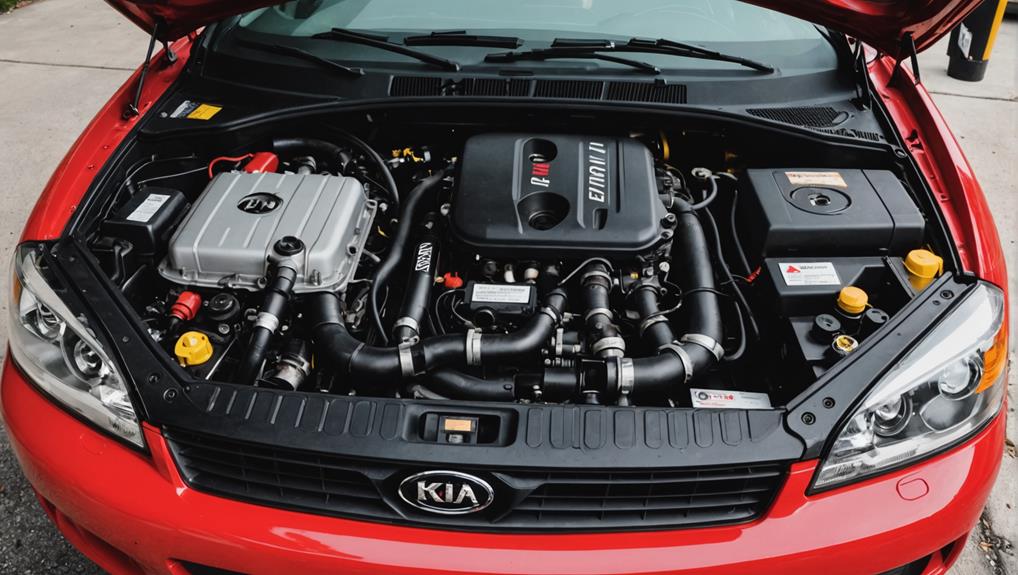
Many Kia Spectra owners encounter fuel system complications that can lead to frustrating performance issues. These issues often stem from a clogged fuel filter, which can restrict fuel flow and cause your engine to sputter or stall. If you notice a decrease in power or fuel efficiency, it might be time to check the filter and replace it if necessary.
Another common problem is a failing fuel pump, which can lead to hard starts or engine hesitation. If your Spectra struggles to start or makes strange noises, it's a good idea to have the fuel pump inspected.
Additionally, some owners report issues with the fuel injectors, which can become clogged over time. Regular maintenance, including using fuel system cleaners, can help keep these components functioning well.
Lastly, don't overlook the importance of using quality fuel. Cheap gas can lead to build-up in your fuel system, affecting performance.
Interior and Comfort Problems
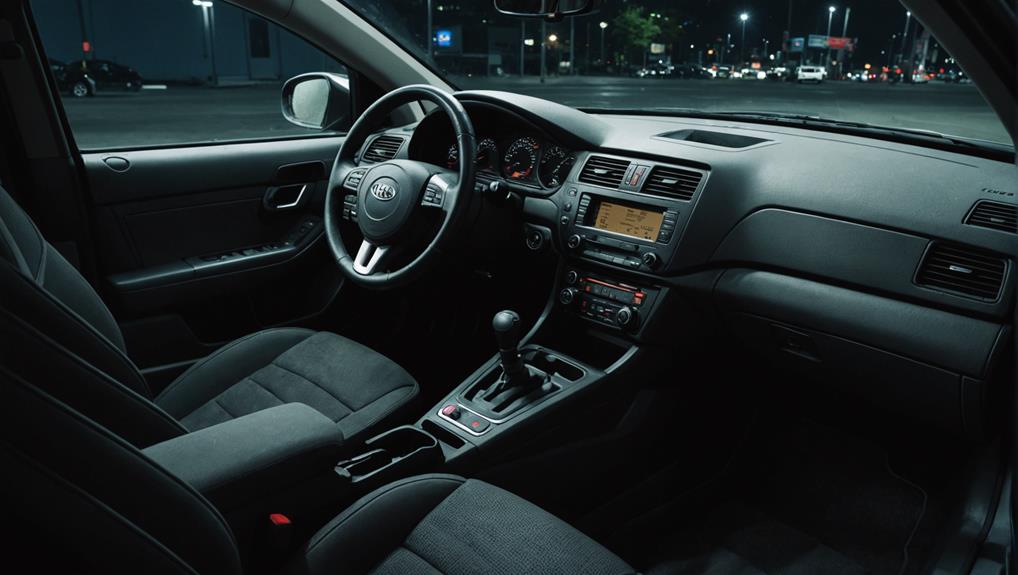
When you settle into your Kia Spectra, you might notice some issues with the interior that affect your comfort.
The durability of the seating material can leave you wanting, while cabin noise levels might disrupt your drive.
Plus, if the climate control isn't working as it should, your experience can quickly become frustrating.
Seating Material Durability
Durability in seating materials is essential for comfort and longevity in the Kia Spectra. Many owners have reported issues with wear and tear on the seats, which can detract from your overall driving experience.
If you want to guarantee your Spectra feels good and stands the test of time, keep an eye on the quality of the materials used in your vehicle's interior.
Here are some common concerns regarding seating material durability:
- Fabric Quality: Some fabrics may fray or fade over time, affecting aesthetic appeal.
- Stitching Integrity: Loose or unraveling stitches can lead to further damage or discomfort.
- Resistance to Stains: Some materials stain easily, making it hard to maintain a clean look.
- Wear Patterns: Frequent use can create uneven wear, especially in high-contact areas.
- Comfort Over Time: The cushioning may degrade, impacting comfort on long drives.
Cabin Noise Levels
Cabin noise levels can greatly impact your driving experience in the Kia Spectra. If you're frequently bothered by road noise, wind noise, or engine sounds, it can detract from the overall comfort of your ride. Understanding the common sources of noise can help you address these issues effectively.
Here's a quick overview of typical cabin noise sources:
| Noise Source | Description |
|---|---|
| Road Noise | Sound from tires interacting with the pavement. |
| Wind Noise | Noise created by air flowing over the vehicle. |
| Engine Noise | Sounds that penetrate the cabin from the engine bay. |
To minimize cabin noise, consider using sound-deadening materials or ensuring windows and doors are properly sealed. Regular maintenance can also help reduce noise from wear and tear.
If you're planning to serve others by providing a comfortable ride, tackling cabin noise issues can make a significant difference. Your passengers will appreciate a quieter environment, making every journey more enjoyable. Remember, a little effort can lead to a more pleasant driving experience in your Kia Spectra.
Climate Control Issues
Experiencing discomfort due to climate control issues in your Kia Spectra can be just as frustrating as dealing with excessive cabin noise.
You rely on your vehicle's heating and cooling system to create a comfortable environment, so when it malfunctions, it can really impact your driving experience.
Here are some common climate control problems you might encounter:
- Inconsistent Temperature: You may notice that some areas of the cabin are too hot or too cold.
- Weak Airflow: The vents mightn't be pushing out enough air, making it hard to maintain comfort.
- Unpleasant Odors: Musty smells can indicate mold or mildew in the ventilation system.
- AC Not Cooling: The air conditioning system may fail to cool down the cabin effectively.
- Heater Malfunction: You might find that the heater isn't warming up the interior when needed.
If you're facing any of these issues, it's crucial to address them promptly.
Regular maintenance and checks can help prevent these problems, ensuring you and your passengers stay comfortable on every journey.
Regular Maintenance Tips
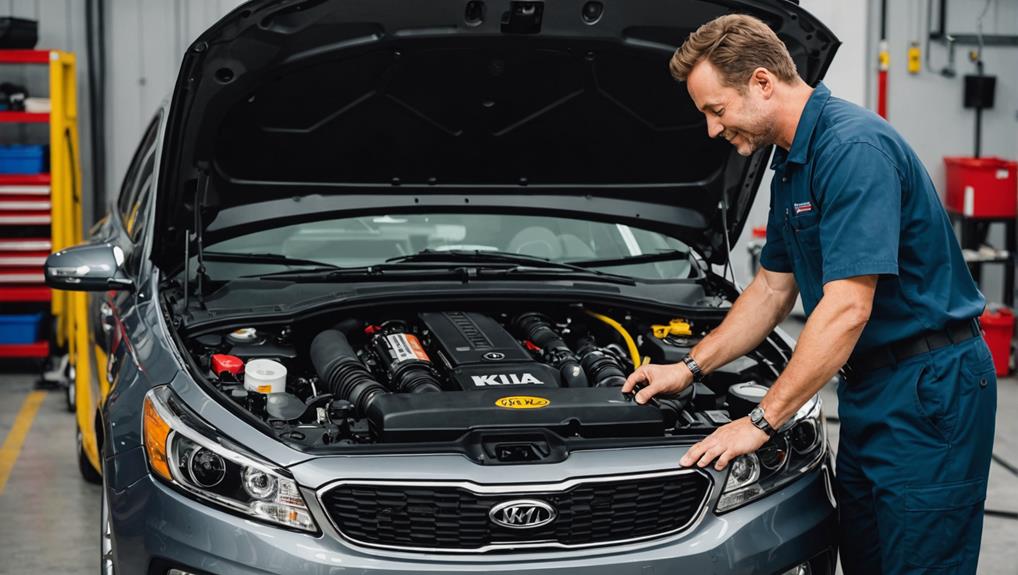
Regular maintenance is essential for keeping your Kia Spectra running smoothly and efficiently, especially considering its legacy in the compact car market.
By following a few simple tips, you can help guarantee your vehicle stays in prime condition and serves you well for years to come, reflecting the impact of the Kia Spectra on automotive reliability.
Start with regular oil changes. Check your owner's manual for the recommended intervals, and don't forget to change the oil filter each time.
Next, inspect your tire pressure monthly and rotate your tires every 5,000 to 7,500 miles. Properly inflated and rotated tires not only improve fuel efficiency but also enhance safety.
Keep an eye on your brake system, too. Listen for any unusual sounds and have your brake pads checked regularly.
Additionally, clean or replace your air filter as needed to maintain peak engine performance and fuel economy.
Resources for Owners
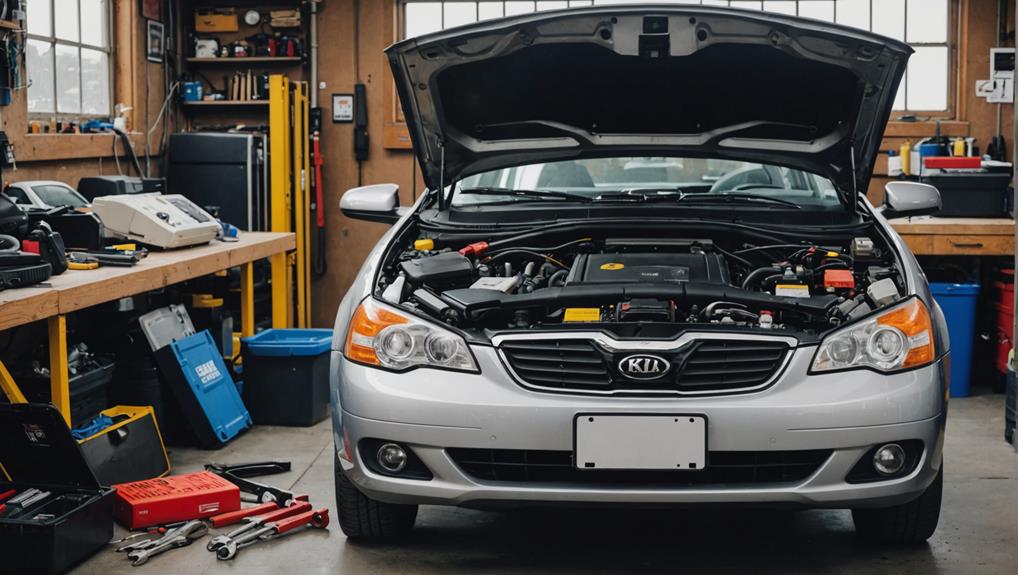
As a Kia Spectra owner, you have access to a variety of resources that can help you maintain your vehicle and address any issues that arise.
Leveraging these resources not only enhances your driving experience but also empowers you to serve others by sharing useful information.
Here are some valuable resources at your disposal:
- Owner's Manual: This essential guide provides detailed information on maintenance schedules, troubleshooting tips, and specifications.
- Kia Forums: Join online communities where you can connect with other Spectra owners. Sharing experiences and solutions can be incredibly helpful.
- Local Mechanics: Establish a relationship with a trusted mechanic who specializes in Kia vehicles for personalized service and advice.
- Kia Customer Service: Don't hesitate to reach out to Kia's customer support for any inquiries or concerns you may have.
- DIY Guides and Videos: Utilize online tutorials that offer step-by-step instructions on common repairs and maintenance tasks.
Frequently Asked Questions
What Are the Most Common Safety Issues Reported by Kia Spectra Owners?
When you explore the safety concerns reported by Kia Spectra owners, you might notice issues related to airbags not deploying properly, which can be alarming.
Some drivers have experienced braking system failures, impacting stopping power.
Additionally, you might find complaints about visibility due to ineffective headlights.
It's essential to stay informed about these potential problems to guarantee you and others remain safe on the road while driving your Kia Spectra.
How Does the Kia Spectra Handle in Different Weather Conditions?
You might be surprised to find that the Kia Spectra handles quite well in various weather conditions.
When it rains, its responsive steering helps you maintain control, while the tires grip the road effectively.
In snowy or icy conditions, you'll appreciate its stability; just remember to drive cautiously.
Overall, you'll feel confident maneuvering through different weather, ensuring safety for both you and those around you.
It's all about being prepared for whatever comes your way.
Are There Any Known Recalls Affecting the Kia Spectra?
Yes, there are known recalls affecting the Kia Spectra.
You should check the National Highway Traffic Safety Administration (NHTSA) website or contact your local dealership to find out if your vehicle is impacted.
They'll provide information on any necessary repairs or safety updates.
Staying informed about recalls is essential for your safety and the longevity of your car, so make it a priority to keep up with any official notifications.
What Should I Do if My Kia Spectra Has a Warning Light?
If your Kia Spectra's warning light comes on, it's crucial to take it seriously.
Did you know that 60% of drivers ignore warning lights, risking further damage?
First, check your owner's manual for specific light meanings.
Don't hesitate to visit a mechanic for a diagnostic if you're unsure.
Addressing the issue early can save you time and money in the long run, ensuring your car stays in top condition for serving others.
How Does the Resale Value of the Kia Spectra Compare to Competitors?
When you're looking at the resale value of the Kia Spectra, it generally falls behind some competitors like Honda and Toyota.
Its value can diminish quicker due to perceptions about reliability and brand strength.
However, if you've taken great care of your Spectra, you might still find a decent offer.
Always compare market listings and consider factors like condition and mileage to get the best resale experience possible.
Conclusion
In the world of car ownership, "an ounce of prevention is worth a pound of cure." By staying informed about common issues with the Kia Spectra, you can tackle problems before they escalate. Regular maintenance, prompt repairs, and awareness of potential concerns will keep your ride smooth and enjoyable. Remember, it's easier to steer clear of trouble than to fix it once it arises. Stay proactive, and your Kia will serve you well on the road ahead.

